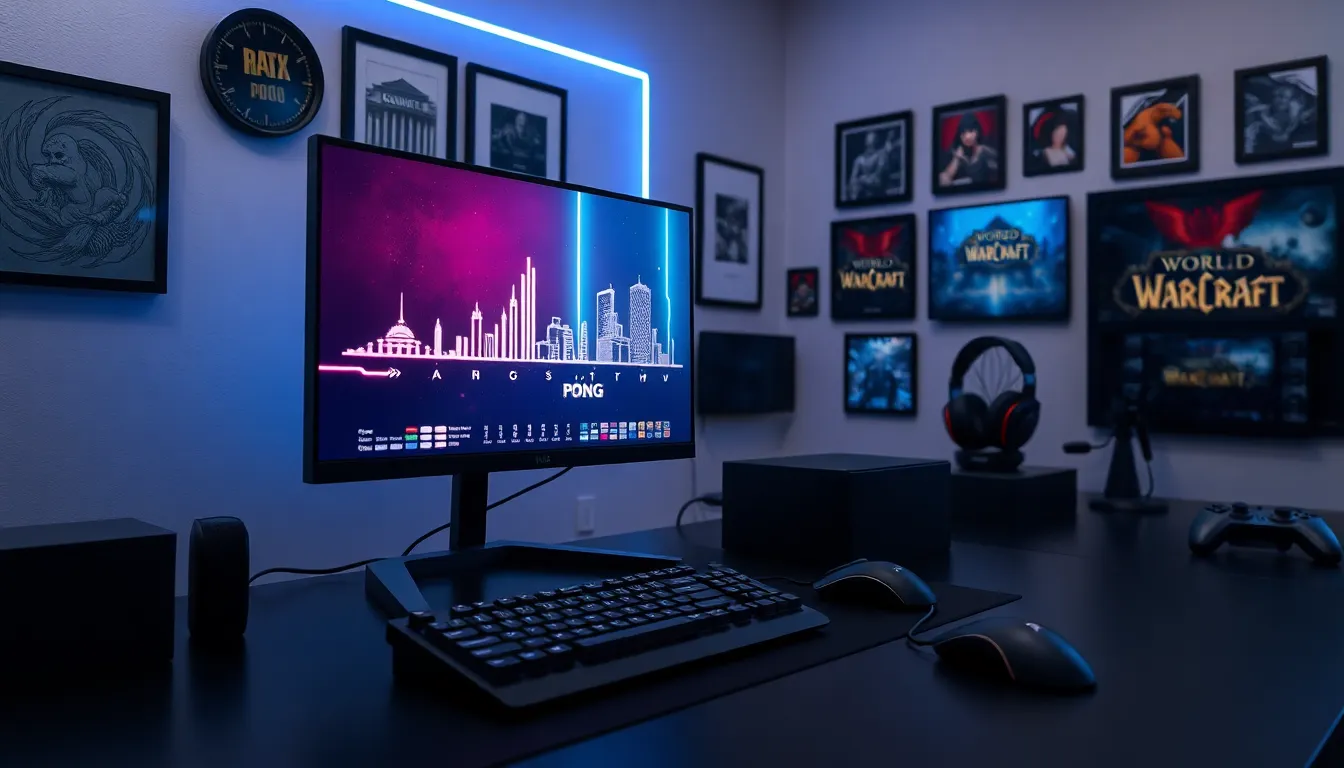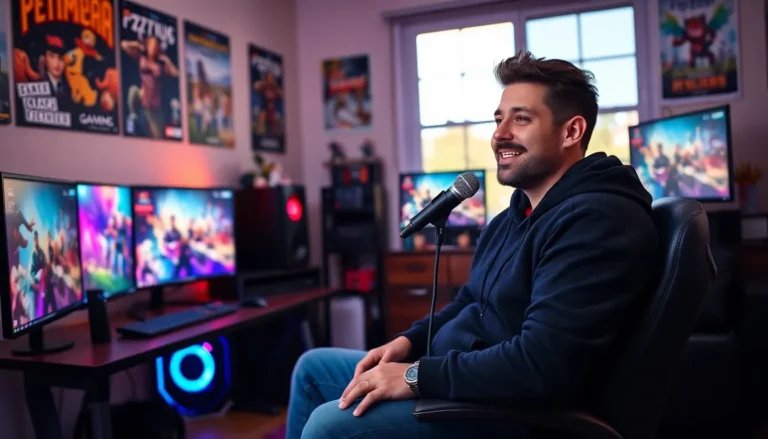If you think gaming is all about sitting in a dark room, shoving Cheetos into your face while shouting at your screen, think again. Welcome to “Ramblings Of A Gamer,” where the pixels are bright, the community is vibrant, and the narratives are often more engaging than the plot twists in your favorite soap opera. This article will take you on an exciting journey through gaming culture, exploring its evolution, the flavors of modern genres, the role of social media, and a few personal reflections that might just strike a chord. So, buckle up. It’s time to level up your understanding of gaming culture.
Table of Contents
ToggleThe Evolution Of Gaming: A Historical Perspective

Key Milestones In Gaming History
The world of gaming hasn’t always meant high-definition graphics and immersive storylines. Once upon a time, it began with a simple dot bouncing across a screen. Fast forward a few decades, and we find ourselves navigating expansive virtual worlds that seemingly have no end. The journey from classic arcade games to today’s complex consoles and PC setups has been nothing short of remarkable.
Key milestones include the release of iconic games like “Pong” in 1972, which started the arcade craze, and the launch of the NES in the 1980s, which introduced countless gamers to the concept of home consoles. The rise of the internet in the 90s opened doors for multiplayer gaming, impacting the social dynamics of play. Who can forget how “World of Warcraft” took the world by storm in the early 2000s, creating a new era of massively multiplayer online role-playing games (MMORPGs)?
Every step in this evolution reflects technological advances, market demands, and player preferences. It’s a wild ride that continues to evolve, showcasing the resilience and adaptability of gaming.
Impact Of Gaming On Society
Gaming has grown into a cultural phenomenon, influencing everything from fashion to film. But, it’s also sparked debates about its impact on society. Critics have long pointed to potential negatives, from violent behavior to social isolation. But, recent studies suggest gaming offers significant benefits. For instance, it enhances cognitive skills, improves problem-solving abilities, and fosters teamwork.
Also, gaming has become a platform for social interaction, breaking barriers and connecting people from all walks of life. The rise of online gaming communities has provided players a space to belong, share experiences, and connect regardless of geographical boundaries. In the grand scheme of things, gaming is not just entertainment: it’s a community-builder and a bridge between cultures.
Popular Genres And Trends In Modern Gaming
Understanding The Appeal Of Different Game Genres
The appeal of gaming lies in its immense variety. From first-person shooters (FPS) that get the adrenaline pumping to peaceful farming simulations that calm the mind, the genres cater to diverse tastes. Action games like “Call of Duty” are all about quick reflexes and strategy, while role-playing games (RPGs) like “The Witcher 3” offer rich storytelling and character development.
Typically, gamers gravitate towards genres that resonate with their interests or offer an emotional escape. It’s fascinating how a platformer like “Super Mario” can bring nostalgia while strategic games like “Civilization” engage players’ tactical thinking, appealing to their inner strategist. Each genre serves a different purpose, fulfilling unique needs for adrenaline, connection, or introspection.
Emerging Trends In The Gaming Community
As the gaming landscape evolves, trends rise and fall faster than you can say “Game Over.” Currently, the rise of mobile gaming is shaking things up, with titles like “Among Us” and “Genshin Impact” demonstrating that you don’t need a console to have a great gaming experience. Virtual reality (VR) and augmented reality (AR) games are also gaining traction, creating immersive experiences that investigate deeper than traditional gaming.
Also, the emphasis on inclusivity has transformed the community, with developers striving to create games that represent a wider array of identities. Titles focusing on mental health themes and social issues are gaining recognition, further transforming what gaming can achieve. The future holds exciting possibilities, as these trends reflect growing player demands for representation and engagement.
The Role Of Social Media In Gaming
Connecting Gamers Through Platforms
In the age of social media, the gaming community has never been more interconnected. Platforms like Discord, Twitter, and Reddit allow gamers to share experiences, advice, and the occasional meme. Forums serve as lifelines for players seeking help or collaboration, providing a space where they can connect over common interests or games.
Social media also elevates gaming culture by creating avenues for real-time discussions about trends, game releases, and industry news. Gamers share victories, tutorials, and critiques, fostering a dynamic conversation that shapes the community and influences developers. The social aspect of gaming transforms it from solitary gameplay into a collective experience.
Content Creation And Streaming
Let’s face it: the old “watching paint dry” has nothing on watching someone else play video games. Streaming platforms like Twitch and YouTube Gaming have exploded in popularity, allowing gamers to showcase their skills, comment on games, and connect with their audiences in real-time.
Creators have built careers around engaging gameplay and insightful commentary, turning ordinary gaming sessions into entertainment spectacles. The charm of live streaming lies in its unpredictability: viewers tune in for the gameplay but often stay for the personalities. Streamers often evolve into multi-dimensional influencers, driving new trends in gaming, creating their merch, and collaborating with brands.
Personal Reflections: My Journey As A Gamer
What Gaming Means To Me
For many, gaming is more than just a pastime: it’s a lens through which they view the world. It’s about community, challenge, and creativity. Each game represents a unique narrative, a story waiting to be explored. From epic quests to cozy farming simulations, these virtual adventures offer solace and excitement.
Engaging in different gaming experiences has shaped perspectives and built resilience. Those levels of life, where you feel stuck, can often mirror real-life obstacles that players navigate in games. Through gaming, there’s room to think outside the box, adapt strategies, and sometimes just take a leap of faith.
Lessons Learned Through Gaming
Gaming teaches invaluable lessons that extend beyond the screen. Collaboration is crucial in multiplayer games, emphasizing teamwork and communication. The thrill of victory is always sweeter after weathering losses and learning from mistakes. Character development in RPGs often reflects personal growth: players see the benefit of persistence and strategy in overcoming challenges.
These lessons pave the way for personal development and adaptability in real life. The resilience cultivated while gaming strengthens confidence for tackling life’s hurdles. Every time a player conquers a challenging level or wins a tough match, it reinforces an important truth: failure is not the end: it’s just a stepping stone to success.





